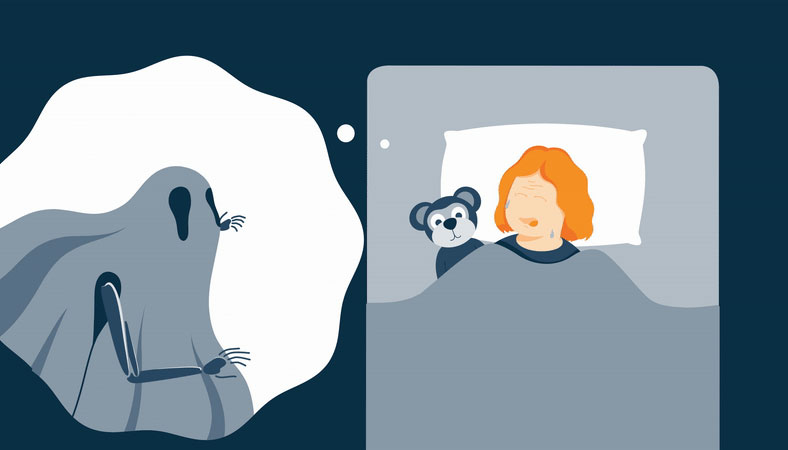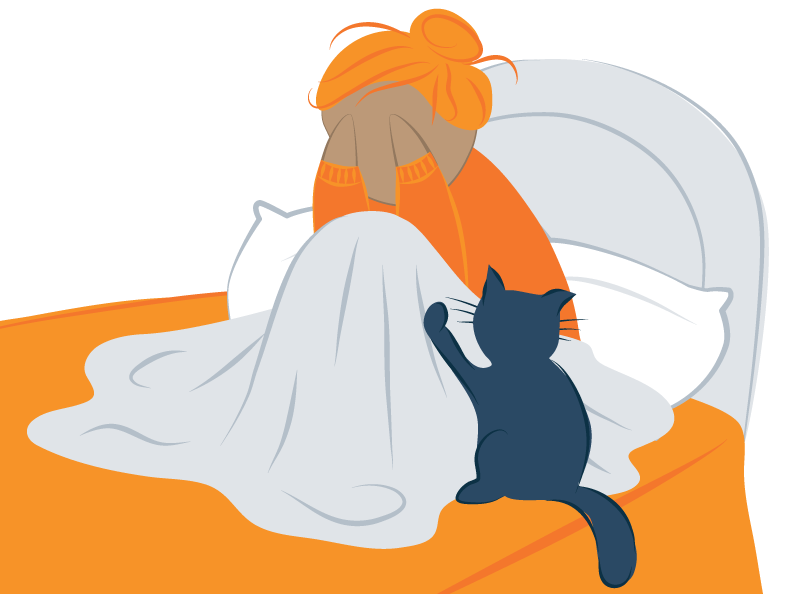This article was expert reviewed by Dr. Lori A. Russell-Chapin L.C.P.C.
Also known as somniloquy, sleep talking causes someone to talk while they’re asleep; this phenomenon falls under the umbrella term parasomnia. Other parasomnias include sleepwalking, night terrors, teeth grinding, and even sex while asleep.
The noises that sleep talkers make are typically more like groans, grunts, whispers, or laughs. Other times, the person could be having an entire conversation; however, you’ll only hear the side of the sleeper.
According to one study, the most commonly used word is “No,” and profanities also make frequent appearances in this dialogue. On occasion, people who sleep talk will make rude or vulgar comments— but keep in mind that the person talking is unconscious.
Suspected causes include several factors[1], including medication, stress, alcohol, and poor sleep hygiene— and the more you know, the more you can help the condition. Below we’ll further discuss current research on talking in your sleep and how you can improve your condition.
What Are the Symptoms of Sleep Talking?
Looking for symptoms before you realize you’re sleep talking will likely be a fruitless effort as the symptoms only occur while you’re unconscious. The main symptom of the disorder will be a verbal or audible expression or noise.
For example, you could be saying a few sentences or mere gibberish, and both would be considered sleep talking. In fact, according to a linguistic study of sleep disorders, about 50% of recorded sleep talking consists of mumbled speech.[2]
A large number of the recordings were exclamatory, profane, or negative in some way, which could indicate whatever is happening in the afflicted individual’s dreams. Episodes are often quick, and rarely long or conversational. There is some research suggesting a correlation to dreams; however, the ties remain inconclusive.[3]
Who Experiences Sleep Talking?
This occurrence is quite common in children, with about 50% of kids from the ages of 3 to 10 having frequent incidences.[4] Boys and girls are equally likely to talk while asleep, and experts theorize there could be a genetic link. If a parent had this habit when they were a kid, research indicates that the offspring are more likely to exhibit the same behavior.
Surprisingly, men have more reported incidents than women.
What Causes Talking in Your Sleep?
REM Sleep Behavior Disorder
Dreaming occurs during REM (rapid eye movement).[5] This sleeping stage accounts for about 20 to 25% of the total time we spend asleep, and it’s a busy time for our brains. During this stage, eyes flutter rapidly underneath the eyelids, blood pressure rises, the heart rate increases, and brain wave activity is similar to being awake.
During the REM phase, the body remains at rest, nearly paralyzed, which prevents us from acting out our dreams, that is, unless someone has REM Sleep Behavior Disorder (RBD). People with REM Sleep Behavior Disorder may indeed act out their dreams. Not only does this mean they could talk, but they could also get violent or even get out of bed to move around.
Sleep Terrors
Sleep terrors are more commonly associated with children, but they can happen in adults, too. During a night terror, the person may seem like they’re awake. They could be screaming, yelling, kicking, and thrashing while they’re frightened about some vision they’re having, whether it’s a dream or a hallucination.[6]
The next morning, the person with the night terror is unlikely to recall what happened.
Nocturnal Sleep-related Eating Disorder
If you’re wondering where your breakfast cereal went, you may want to look inward. NS-RED or Nocturnal Sleep-Related Eating Disorder happens when people eat while they are asleep.[7] They could even go into the kitchen and prepare an entire meal while completely unconscious.
As you might imagine, if someone confronts the person while they’re devouring pantry goodies, they could potentially carry on a conversation, which would be another example of somniloquy.
Mental Health Conditions
Mental health disorders are frequently linked to sleep disorders as well. However, at this point, scientists cannot pinpoint if the mental health problem results in the disorder or if having a sleeping disorder results in mental health challenges. This chicken-egg scenario makes it difficult to discern the cause, but it could be helpful to keep in mind if you’re stuggling with either condition.
Medication
If you’re talking in your sleep, check any prescription drugs you’re taking to find out if one of the potential side effects could be somniloquy. Some individuals react uniquely to different medications due to individual genetic makeup. So it’s possible your doctor may need to adjust the medication or dosage.
Emotional Stress
Those with irregular sleep patterns are more likely to talk in their sleep. It could be because the brain is having trouble shutting down for the night, which disrupts the sleep cycle, or it might be the subconscious mind working overtime, trying to figure out a solution to a pressing problem.
Fever
Sleep talking while running a high fever is relatively common. This is because the body and brain are typically exhausted, as they’re diverting critical energy and resources to boost the immune system; rather than regulate what your body is doing during restful periods. Therefore, you may be more vulnerable to a nighttime talking incident.
Substance Abuse
Some drugs act as stimulants, keeping you awake. Others induce a state of drowsiness. Either way, the effects are artificial, and they wear off. In response, your body’s internal clock or circadian rhythm could be affected, throwing off the timing of your regular sleep schedule. As a result, you could have disruptions that could lead to talking while you’re asleep.
Sleep Deprivation
Not getting enough shut-eye could lead to somniloquy. Scientists theorize that people who aren’t resting enough have trouble passing seamlessly between the stages of sleep.
You may take longer to shift from slow-wave sleep to the lighter stages, creating a larger opportunity for an incident. Those with this type of sleep disorder may also have a hard time waking up. The lengthened stage of grogginess could also cause you to talk, even though you’re not fully awake or conscious.
Genetics
If you’re sleep talker, you might be able to blame your parents. There’s been a genetic component to somniloquy that’s been identified, and while research is still inconclusive, many experts agree that genetics likely play a major factor.[8]
Alcohol
Like drugs, alcohol could also induce an episode. The initial drowsiness you feel after a glass of wine or two could cause you to fall asleep sooner than you would naturally. As the effects of the alcohol wear off, it could cause you to wake up, even just partially, which is an ideal setup for an incident.
How to Stop Sleep Talking
Make Sure You’re Getting Enough Sleep
One of our resident medical experts, Dr. Russell-Chapin, co-director for the Center for Collaborative Brain Research, explains that healthy sleep hygiene is critical. “When we go to sleep, our brains should be using the right brainwave for the right task at the right time. When healthy, the brain will often go from beta to alpha to theta to delta. If not, we get these unique sleep disorders.”
Manage Stress
Life can be stressful, and some of us are better at handling stress than others. If you let stress take over your life, it can lead to trouble sleeping. When you do finally fall asleep, you’re not likely to be able to rest as deeply. Similar to substance abusers, your body may have trouble shifting between sleep cycles, which could significantly increase your chance of somniloquy, sleep terrors, and more.
Limit Caffeine and Alcohol
Similar to substance abuse, ingesting things that aren’t healthy for our body could impair our ability to function normally. Further, if you’re habitually drinking both, you’re revving your brain up with caffeine, and then essentially telling it to calm down with alcohol; and these mixed messages could possibly be triggering episodes.
Seek Medical Advice
The advice of a doctor may help you shed some light on the situation. For example, a medication you’re taking could be at the heart of the issue. Your physician’s expertise might recommend that you avoid certain foods or activities before bed; we’re all unique, and sometimes a professional’s help is necessary.
Develop Good Sleep Habits
The best way to ensure a peaceful night of uninterrupted rest is to develop good bedtime habits, also called sleep hygiene. This means getting plenty of shut-eye and going to bed and waking up at the same time each day. Keep electronic devices out of the bedroom and consider adopting relaxing bedtime rituals, like reading a novel or drinking a cup of herbal tea.
Eliminate Noise
If your partner is the one who’s talking in their sleep, then you may want to block out any surrounding disturbances. Try headphones that are specially designed for lying down for sleep or silicone earplugs. You could also try a white noise machine, which could help to drown out background noises in addition to nocturnal mumblings.
View Our Guide: Best Headphones for Sleeping
Keep a Sleep Diary
You’ll need the help of a partner or an app that records when you’ve been talking at night. Then take note of everything of importance that could cause a somniloquy. Note the time you went to bed and woke up, how long it seemed to take you to fall asleep, any food or drink you consumed that day and even stressful incidents that could have affected your ability to get adequate shut-eye.
Over time, you may notice a pattern emerge. Once that happens, you can take steps to minimize or eliminate it altogether.
Frequently Asked Questions
Is it common in toddlers and children?
Yes, a toddler talking in sleep can happen in nearly 50% of children that age. In fact, up until about the age of 10, about half of all kids will have a semi-regular sleep talking habit. Fortunately, most people outgrow this habit. Only about 5% of adults display this behavior.
Does sleep talking have a significant meaning?
Usually, there’s a biological explanation for this parasomnia. Chronic fatigue, stress, and medications are all linked to this condition. However, in the absence of any of these factors, there could be a spiritual component. It might sound a bit “out there,” but inner energy shifts, emotional traumas coming to the surface, psychic disturbances, and actively processing internal conflicts through the dreaming process could all be potential triggers.
When you talk in your sleep, are you telling the truth?
Fortunately for those who sleep talk, the words usually contain little to no truth. The person afflicted is expressing audible noises or words in an unconscious state, and therefore has little capacity to discern between a real topic or a dream.
Sources and References:
- [1] Ratan-NM. “Causes of Somniloquy (Sleep Talking).” News, 18 Dec. 2020
- [2] Arnulf, Isabelle, et al. “What Does the Sleeping Brain Say? Syntax and Semantics of Sleep Talking in Healthy Subjects and in Parasomnia Patients.” OUP Academic, Oxford University Press, 15 Nov. 2017
- [3] Nielsen, Tore, et al. “Dream-Enacting Behaviors in a Normal Population.” OUP Academic, Oxford University Press, 1 Dec. 2009
- [4] “Somniloquy.” Somniloquy – an Overview | ScienceDirect Topics
- [5] Purves, Dale. “The Possible Functions of REM Sleep and Dreaming.” Neuroscience. 2nd Edition., U.S. National Library of Medicine, 1 Jan. 1970
- [6] “Sleep Terrors.” Stanford Health Care (SHC) – Stanford Medical Center, 12 Sept. 2017
- [7] “Sleep-Related Eating Disorder.” National Institutes of Health, R.Robert Auger, 2006 Nov; 3(11): 64–70
- [8] National Institute on Drug Abuse. “Connections between Sleep and Substance Use Disorders.” National Institute on Drug Abuse, 9 Mar. 2021
- [9] “Sleeptalking.” MedLink Neurology

Rachael Gilpin
Content Writer
About Author
Rachael is a content writer for Sleep Advisor who loves combining her enthusiasm for writing and wellness.
Back Sleeper




